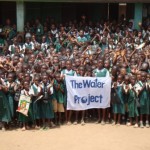This very large project included a full well rehab and construction of the new latrines. The team has also spent a great deal of time training students and community leaders about proper hygiene.
Our implementing partner reports...
"A team member stated, 'Seeing communities come together for the sake of improving their health during the hygiene training was remarkable. The community was inspired to make positive changes in their lives' When the team arrived, community members were utilizing a river located three kilometers away from the community, to meet all of their water needs. Because of the community's dependence on this contaminated water source, families were suffering from dysentery, typhoid and malaria. The Sierra Leone team was pleased to learn of the community's use of an open pit latrine as this will help prevent further spread of disease in the area.
During the team’s stay, community members assembled a water committee consisting of seven men and two women who assisted the team with the water project whenever possible, helped provide security over the water project during the night and provided housing for the drill team. Most community members sustain their families by farming, some work as petty traders, teachers and others harvest palm wine to sell at nearby markets. The nearest schools are primary and secondary schools that are located in the community whose students, teachers and administrative personnel all have access to the new, safe water source. Before leaving the community, the team provided community member, Maligie Bangura, with a Mariatu's Hope contact number in case their well were to fall into disrepair, become subject to vandalism or theft.
The Sierra Leone team had an opportunity to meet with fifty-eight year old community member and farmer, Morlia Kamara, who stated, “The stream is so far and it is very dangerous. The water is not pure. We drink it because we have no way to fetch water. The new pump is so secure and it helps us in the community. It protects us from sickness. It is free from germs."
Hygiene Teaching
The hygiene training was conducted over a period of a week and a half because there was a death in the village. In attendance were teachers from both the primary and Jr. secondary schools and several community members from the communities of Foo Foo Water, Sherbro Town and Pepel Corner, all catchment communities of the schools. The participants were engaged and enjoyed the training. Both Foo Foo Water and Sherbro Town have since formed WATSAN committees for their wells and our WASH specialist is continuing to work with them as they form their bylaws and constitution.
There is a Child Health Club that has been formed at this school with 30 students and four leaders, two teachers from the primary school and two teachers from the Jr. secondary school. Weekly meetings are being held. There were 32 adults who participated in the hygiene education. Certificates of attendance were distributed at the dedication for the participants. The Child Health Club members and four teachers received special T-shirts and certificates for being members and leaders of the CHC. The toilet that was constructed is a composting toilet. The teachers were given hygiene manuals of the lessons and they all had an opportunity to teach the lessons back to us to help build their confidence about teaching the lessons. Everyone was so excited about the tippy taps. It's really amazing to see how excited people get over this water saving technique. The team encouraged the teachers to hold workshops with their students and parents in small groups to teach how to make tippy taps.
 WAsH for Schools
WAsH for Schools Rehabilitation Project
Rehabilitation Project












